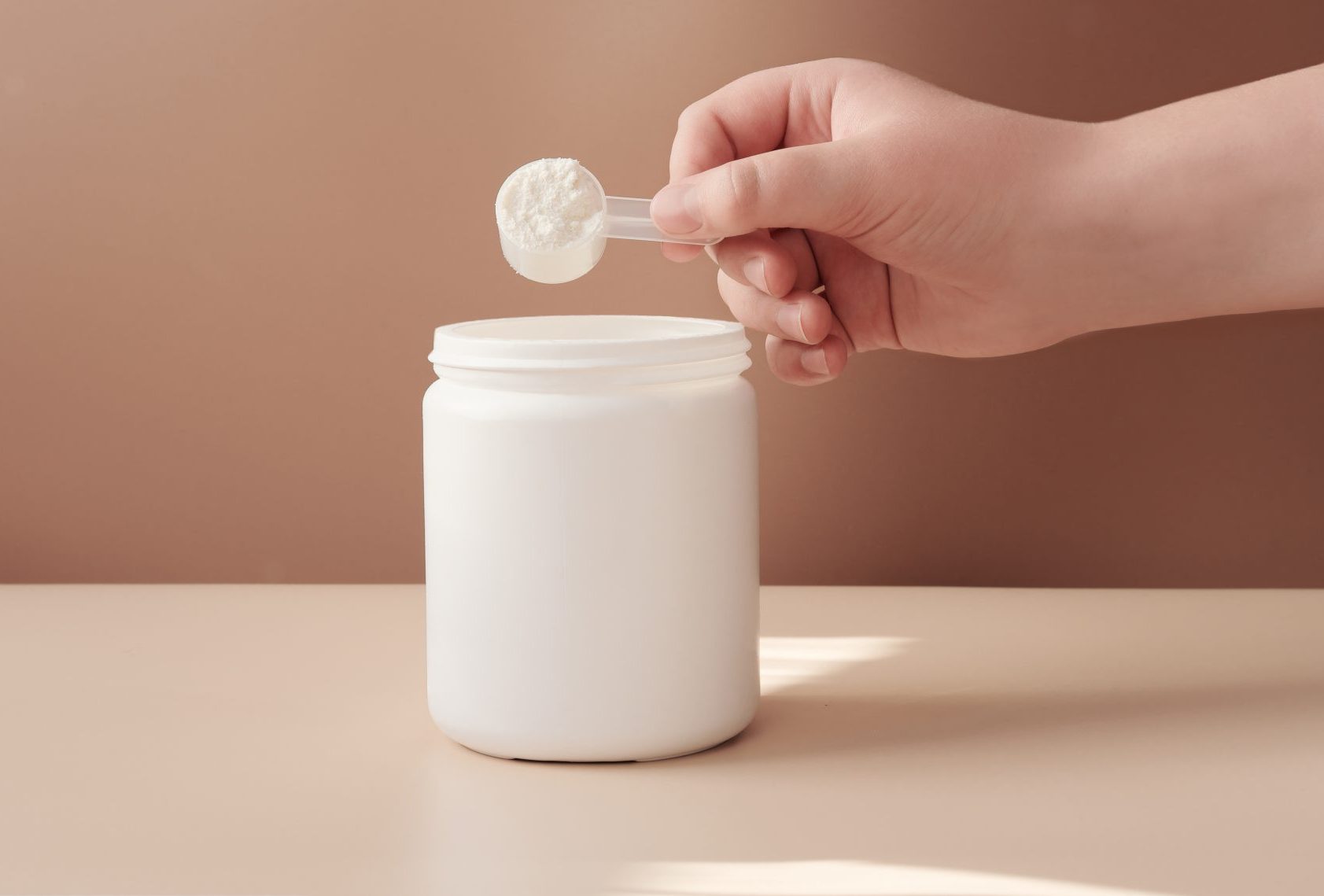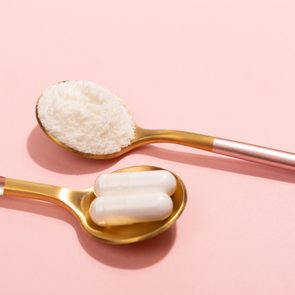5 Benefits of Taking Collagen—and What It Can’t Do
Updated: May 12, 2021
Are the supposed benefits of taking collagen supplements, such as younger-looking skin, legitimate or hype? Here's what the science says.
What is collagen?
Imagine a substance that cushions your joints, plumps up your skin, and supports your organs. Collagen has that job, which helps explain why it’s the most abundant protein in the body—it’s in your skin, cartilage, bones, tendons, and ligaments. There’s even collagen in your eyes and teeth.
The only hitch is that your body produces less and less of this wonderful protein as you get older. As collagen levels decline, troubles creep in: You’ll begin to notice joint pain, muscle weakness, stiffer tendons and ligaments, and your skin may begin to sag and wrinkle.
This has led many people to embrace collagen supplements—why not give your aging body a helping hand, after all? The real question is whether swallowing the protein in pills, powders, or liquids equals more collagen in the places where you actually need it. Check out what the science has to say about the benefits of taking collagen.
Types of collagen
There are several types of collagen, but these are the main types that play the most critical roles in the body:
- Type I is most common, accounting for around 90 percent of the collagen found in the body. Its fibers form a structural and mechanical scaffold of tendons, bones, ligaments, cornea, and skin.
- Type II is found mainly in the cartilage of the ears, nose, larynx, trachea, ribs, and many joint surfaces.
- Type III is a sidekick to Type I, but in a thinner version of the scaffolding of the skin, ligaments, blood vessels, and joints.
- Type IV is primarily found in the layers of the skin and can help with filtration.
How do we make our own collagen?
The body makes its own collagen by breaking down the dietary protein from food into amino acids. It’s not just any food, though. Collagen is made from protein-rich foods, such as chicken, beef, fish, eggs, dairy products, quinoa, soy, and beans.
The amino acids and protein from food work together to build other types of proteins that suit the body’s needs—including collagen. This protein-building process also relies upon foods rich in vitamin C, zinc, and copper. You can get those nutrients from citrus fruits, red and green peppers, broccoli, leafy greens, shellfish, nuts and seeds, and dark chocolate.
Types of collagen supplements
Collagen supplements aren’t limited to just pills or powders. They’re in coffee creamers, gummies, beverages, teas, baked goods, and more. (Here’s how to choose between collagen powder vs. pills.)
Collagen as a functional ingredient in food reached $147 million in sales during the 52 weeks ending October 6, 2019, according to the journal Nutritional Outlook. It is projected to keep increasing as the highly anticipated vegan collagen is now available.
Currently, there are three types of collagen supplements:
Animal-sourced collagen is made from chicken, beef, or pork. Typically the collagen is from the skin, muscles, bones, or tendons.
Marine collagen is sourced from fish, including jellyfish, sponges, and sharks. Collagen from fish skin, bones, and scales are used to make supplements.
Vegan collagen isn’t sourced using any animal products. It’s made from genetically modified yeast and/or bacteria with human genes that code for collagen added to their genetic structure.
“Once the genes are in place, the yeast or bacteria start producing what is essentially human collagen. Pepsin, a digestive enzyme, is added to the mix as well and you end up with an exact replica of human collagen,” says Dana Hunnes, a senior dietitian at the Ronald Reagan UCLA Medical Center and professor at the Fielding School of Public Health.
Benefits of taking collagen
The goal of collagen supplementation is to get it to the precise location we want benefits. However, there are no guarantees collagen supplements will be delivered to a specific location, such as the skin, bones, muscles, hair, and nails.
The makers of collagen supplements say they can improve aging skin, relieve achy joints, or increase muscular strength. And while studies show promise, more research is needed to prove cause and effect, optimal dosage, and how long the benefits might last. Skin experts still need to decipher which types of collagen actually target skin elasticity versus joint pain, or whether one type of collagen can help both causes.
Some of the most promising findings so far are:
Skin
A 2018 meta-analysis study (statistical analysis from 11 studies with over 800 patients) published in the Journal of Drugs in Dermatology found that oral collagen supplements ranging from 2.5 mg per day to 10 mg per day for eight to 24 weeks showed promise in increasing skin elasticity, hydration, and dermal collagen density.
(These are the foods that naturally boost collagen for skin.)
Burn and wound care
There’s more evidence for collagen supplements when it comes to treating burns and wounds.
“Much of the clinical data we have is for wound healing,” says Adam Friedman MD, professor, and chair of dermatology, George Washington School of Medicine and Health Sciences, Washington D.C.
Dr. Friedman points to a small pilot study he co-authored in a 2019 Journal of Drugs in Dermatology. It found that topical collagen powder could help heal wounds from puncture biopsies.
A study from 2020 published in Annals of Burns and Fire Disasters revealed that collagen dressings (sheets, pads, particles, and gels) could ease the pain associated with second-degree burns. Patients required less pain medication with collagen dressings compared with paraffin gauze and silver sulfadiazine.
Another 2020 study published in the journal Materials suggests that collagen-infused hydrogels (a type of wound dressing salve) could enhance collagen production and wound healing in third-degree burn patients.
Osteoarthritis pain and function
The results of 2018 meta-analysis published in International Orthopedics found that collagen is effective in improving osteoarthritis symptoms by decreasing pain and improving function, says orthopedist Bert R. Mandelbaum, MD, co-chair of medical affairs at Cedars-Sinai Kerlan-Jobe Institute in Los Angeles.
“For patients with osteoarthritis, we recommend vitamin D glucosamine sulfate and collagen. For women, the same recommendations apply as well as calcium,” he says.
Bone health
For another study, 131 postmenopausal women took collagen supplements daily for one year in a randomized, placebo-controlled double-blinded investigation. (This is the gold standard as far as studies go, but the research was funded by a collagen maker.)
The results, published in the 2018 journal Nutrients, showed an increase in bone mineral density and a shift towards increased bone formation and reduced bone degradation.
Heart health
Taking collagen twice a day may help your heart. In a small 2017 study of 32 healthy people, published in the Journal of Atherosclerosis and Thrombosis, researchers asked them to take a collagen tripeptide (a supplement made from three amino acids) twice a day during breakfast and dinner for a total of 16 grams a day for six months.
The researchers measured the effect of the supplement on atherosclerosis (a build-up of cholesterol plaque in the artery walls). The findings revealed markers of atherosclerosis, like cholesterol and arterial wall stiffness, improved during the study period. They believe that collagen helps preserve the elasticity in blood vessel walls, preserving healthy blood flow.

A lot of hype, a little science
The benefits above show promise, but the hype on collagen supplements sometimes pushes ahead of the evidence.
You’ll see claims that collagen supplements reduce wrinkles, for example, especially around supplements that contain peptides (small pieces of collagen) with vitamin C or zinc. The thrust is that the nutrients help regulate collagen synthesis or formation, explains Pooja Sodha, MD, director of cosmetic dermatology at George Washington Medical Faculty Associates, in Washington, D.C. “But the benefits of vitamin C and zinc are still being fully vetted, and whether they are responsible for the suspected collagen effects does come into question,” she says.
Another way collagen claims get stretched: Some studies show taking collagen supplements improved joint function and pain, which collagen supplement manufacturers often highlight on their products. What may not be mentioned is that the study participants took collagen alongside other pain relievers.
So, can you naturally boost collagen levels?
Collagen levels consistently drop as we age—it’s a natural part of the aging process. However, there are some things we can do to show collagen a little love and support it.
“We know collagen is degraded by UV radiation (sun damage), which causes deeper wrinkles,” says Richard Browning, MD, a dermatologist at UCHealth Dermatology Clinic, Cherry Creek in Colorado.
Radiation is a form of oxidative stress—that’s when there’s an imbalance in the body between damaging molecules known as free radicals, and antioxidants—the substances that can rein in the free radicals.
Other sources of oxidative stress that can harm collagen and collagen production include smoking, pollution, pesticides and cleaners, excessive alcohol consumption, and diets high in fats and sugar.
Laser therapy
When it comes to aging skin concerns, the most effective treatment for boosting collagen is laser therapy. “In the simplest terms, these laser devices deliver energy to the dermis, which can stimulate new collagen production,” says Dr. Browning. Certain dermal fillers induce collagen production, too. (Here’s more about collagen injections.)
“This is a gradual process over several months and is an option for those with significant volume loss seeking more durable results. The effects can last up two years or longer, depending on the age degree of volume loss at onset, and other health considerations,” says Dr. Sodha.
Should you buy collagen supplements?
If you want to give collagen supplements a try, here are some things to consider.
Check for a third-party certifier
Not all collagen supplements are created equal. As with all dietary supplements, collagen supplements aren’t regulated by the Food and Drug Administration (FDA), so there’s no guarantee the ingredients promised are in the bottle or the potency of them, but the trials have shown collagen supplements to be safe.
Check the label for a third-party certifier such as NSF International, UL, or USP.
Taking more collagen doesn’t mean more benefits
Taking more collagen doesn’t equate to greater benefits. “In terms of the quantity of daily supplementation, studies range from a few grams to 10 grams, and so more studies are needed to understand where the optimal dosing may be,” says Dr. Sodha.
You might have to keep buying collagen supplements for a long time. If you start to notice benefits when using collagen supplements, you’ll be dipping into your wallet for years to come to maintain the benefits.
“The body starts to lose 1 percent of collagen per year by enzymatic degradation and other aging-related changes. This process of degradation is not altered by supplementation, so without the constant supply this process will undo the benefits of collagen,” says Dr. Sodha.
Taking collagen at a younger age has no added benefit
Taking collagen at a younger age doesn’t give you an extra edge against aging.
“We don’t have long-term follow-up on patients to understand the durability of the anti-aging effects,” says Dr. Sodha. Even if you start using collagen in your 20s when your collagen levels are higher, there’s no evidence they will continue to be effective as you age. “Whether that results in long-term anti-aging effects would need further studies.”
Effects of collagen supplements could be slow
Collagen isn’t cheap, and you might have to take up to three months to see results—if you see any at all. “Collagen supplements can be an expensive product, and the evidence for taking it for a healthy person just isn’t there,” says Hunnes.
Collagen supplements aren’t a cure-all for skin woes
For matters pertaining to the skin, “the evidence is currently lacking to support benefit from collagen supplements. Therefore, I do not recommend them to patients at this time,” says Dr. Browning.
On the other hand, if you’re not eating enough protein or zinc, copper, and vitamin C, your doctor may recommend a specific collagen supplement. And some may suggest a collagen supplement along with other vitamins in conjunction with your prescription medication or as an alternative to medication to help with painful and stiff joints or muscle pains.
Next, here are the best anti-aging supplements worth buying.





















